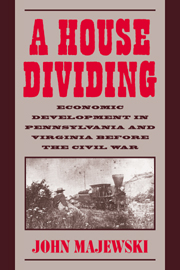Book contents
- Frontmatter
- Contents
- List of Tables
- List of Abbreviations
- Acknowledgments
- Maps
- Introduction: Regional Development in Comparative Perspective
- 1 Developmental Corporations in a Slave-Labor Society
- 2 Developmental Corporations in a Free-Labor Society
- 3 Railroads and Local Development
- 4 The Local Politics of Market Development
- 5 Urban Capital and the Superiority of Pennsylvania's Transportation Network
- 6 Why Antebellum Virginians Never Developed a Big City: Comparative Urban Development in Philadelphia and Eastern Virginia
- Epilogue: Railroad Networks and the Civil War
- Appendix on Sources and Methods
- Bibliography
- Index
6 - Why Antebellum Virginians Never Developed a Big City: Comparative Urban Development in Philadelphia and Eastern Virginia
Published online by Cambridge University Press: 07 September 2010
- Frontmatter
- Contents
- List of Tables
- List of Abbreviations
- Acknowledgments
- Maps
- Introduction: Regional Development in Comparative Perspective
- 1 Developmental Corporations in a Slave-Labor Society
- 2 Developmental Corporations in a Free-Labor Society
- 3 Railroads and Local Development
- 4 The Local Politics of Market Development
- 5 Urban Capital and the Superiority of Pennsylvania's Transportation Network
- 6 Why Antebellum Virginians Never Developed a Big City: Comparative Urban Development in Philadelphia and Eastern Virginia
- Epilogue: Railroad Networks and the Civil War
- Appendix on Sources and Methods
- Bibliography
- Index
Summary
Many Virginians in the antebellum period would have readily agreed with Jane Jacobs, the twentieth-century sociologist who declared that great cities are “the wealth of nations.” Lacking a large city of their own, they realized through hard experience that metropolises were engines of development that made innovation and improvisation part of everyday economic life. George Tucker, a political economist at the University of Virginia, wrote in 1859 that cities “are more favorable to the cultivation of science and the arts of every kind. If they also more favor human depravity and misery, they afford readier means of punishing the one, and of alleviating the other.” State Senator Charles Bruce wrote in 1858 that “I care not how gentlemen cry out against towns and cities, as being sores upon the body politic, for they are, nevertheless, unfailing indices of the wealth and prosperity of the country.” Even George Fitzhugh, the most famous of Virginia's proslavery writers, argued that an independent South “must manufacture for itself, build cities, erect schools and colleges, and carry on all the pursuits and provide for all the common wants of civilized man.” No matter how reactionary their politics, most Virginians could not part with the idea of cities and the progress that they represented.
This chapter tries to explain why antebellum Virginia never came close to developing a city of the size and wealth of Philadelphia.
- Type
- Chapter
- Information
- A House DividingEconomic Development in Pennsylvania and Virginia Before the Civil War, pp. 141 - 167Publisher: Cambridge University PressPrint publication year: 2000



